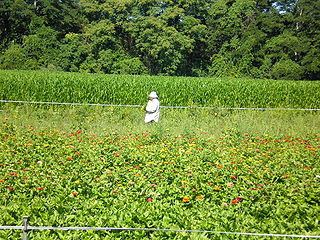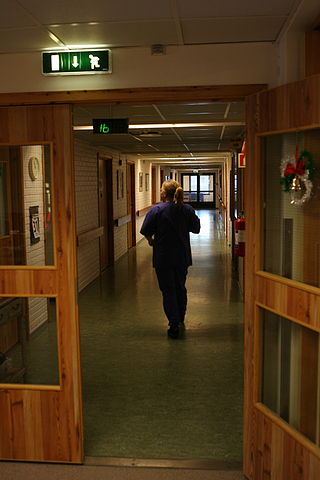Related Research Articles

Foreign workers or guest workers are people who work in a country other than one of which they are a citizen. Some foreign workers use a guest worker program in a country with more preferred job prospects than in their home country. Guest workers are often either sent or invited to work outside their home country or have acquired a job before leaving their home country, whereas migrant workers often leave their home country without a specific job in prospect.
The H-1B is a visa in the United States under the Immigration and Nationality Act, section 101(a)(15)(H), that allows U.S. employers to employ foreign workers in specialty occupations. It is the largest visa category in the United States in terms of guest worker numbers. A specialty occupation requires the application of specialized knowledge and a bachelor's degree or the equivalent of work experience. The duration of stay is three years, extendable to six years, after which the visa holder can reapply. Laws limit the number of H-1B visas that are issued each year. There exist congressionally mandated caps limiting the number of H-1B visas that can be issued each fiscal year, which is 65,000 visas, and an additional 20,000 set aside for those graduating with master’s degrees or higher from a U.S. college or university. An employer must sponsor individuals for the visa. USCIS estimates there are 583,420 foreign nationals on H-1B visas as of September 30, 2019. The number of issued H-1B visas have quadrupled since the first year these visas were issued in 1991. There were 206,002 initial and continuing H-1B visas issued in 2022.
In Canada, temporary residency applies to those who are not Canadian citizens but are legally in Canada for a temporary purpose, including international students, foreign workers, and tourists.

The Immigration Reform and Control Act was passed by the 99th United States Congress and signed into law by U.S. President Ronald Reagan on November 6, 1986.
Since 1945, immigration to the United Kingdom, controlled by British immigration law and to an extent by British nationality law, has been significant, in particular from the Republic of Ireland and from the former British Empire, especially India, Bangladesh, Pakistan, the Caribbean, South Africa, Nigeria, Ghana, Kenya, and Hong Kong. Since the accession of the UK to the European Communities in the 1970s and the creation of the EU in the early 1990s, immigrants relocated from member states of the European Union, exercising one of the European Union's Four Freedoms. In 2021, since Brexit came into effect, previous EU citizenship's right to newly move to and reside in the UK on a permanent basis does not apply anymore. A smaller number have come as asylum seekers seeking protection as refugees under the United Nations 1951 Refugee Convention.

A migrant worker is a person who migrates within a home country or outside it to pursue work. Migrant workers usually do not have an intention to stay permanently in the country or region in which they work.
An H-2A visa allows a foreign national worker into the United States for temporary agricultural work. There are several requirements of the employer in regard to this visa. The H-2A temporary agricultural program establishes a means for agricultural employers who anticipate a shortage of domestic workers to bring non-immigrant foreign workers to the U.S. to perform agricultural labor or services of a temporary or seasonal nature. In 2015 there were approximately 140,000 total temporary agricultural workers under this visa program. Terms of work can be as short as a month or two or as long as 10 months in most cases, although there are some special procedures that allow workers to stay longer than 10 months. All of these workers are covered by U.S. wage laws, workers' compensation and other standards; additionally, temporary workers and their employers are subject to the employer and/or individual mandates under the Affordable Care Act. Because of concern that guest workers might be unfairly exploited, the U.S. Department of Labor Wage and Hour Division is especially vigilant in auditing and inspecting H-2A employers. H-2A employers are the only group of employers who are required to pay inbound and outbound transportation, free housing, and provide meals for their workers. H-2A agricultural employers are among the most heavily regulated and monitored employers in the United States. Unlike other guest worker programs, there is no cap on the number of H-2A visas allocated each year.
A guest worker program allows foreign workers to temporarily reside and work in a host country until a next round of workers is readily available to switch. Guest workers typically perform low or semi-skilled agricultural, industrial, or domestic labor in countries with workforce shortages, and they return home once their contract has expired.
Nursing in the United Kingdom is the largest health care profession in the country. It has evolved from assisting doctors to encompass a variety of professional roles. Over 700,000 nurses practice, working in settings such as hospitals, health centres, nursing homes, hospices, communities, military, prisons, and academia. Most are employed by the National Health Service (NHS).

A nursing shortage occurs when the demand for nursing professionals, such as Registered Nurses (RNs), exceeds the supply locally—within a healthcare facility—nationally or globally. It can be measured, for instance, when the nurse-to-patient ratio, the nurse-to-population ratio, the number of job openings necessitates a higher number of nurses than currently available, or the current number of nurses is above a certain age where retirement becomes an option and plays a factor in staffing making the workforce in a higher need of nurses. The nursing shortage is global according to 2022 World Health Organization fact sheet.
In Australia, the 457 visa was the most common visa for Australian or overseas employers to sponsor skilled overseas workers to work temporarily in Australia. It was abolished on 18 March 2018 by the Turnbull government and replaced by another visa category. The full title of this subclass of visa was Temporary Business (Long Stay) and was introduced soon after John Howard became Prime Minister in 1996. The title of the visa was changed to Temporary Work (Skilled) (Subclass 457) visa on 24 November 2012. Applications were processed by the Department of Immigration and Border Protection (DIBP). On 18 April 2017, Prime Minister Malcolm Turnbull announced that the 457 visas will be replaced with two new visa categories.
A work permit or work visa is the permission to take a job within a foreign country. The foreign country where someone seeks to obtain a work permit for is also known as the "country of work", as opposed to the "country of origin" where someone holds citizenship or nationality.
The UK Work Permit scheme was an immigration category used to encourage skilled workers to enter the United Kingdom (UK) until November 2008, when it was replaced by the points-based immigration system. It provided an opportunity for overseas citizens seeking to gain valuable international work experience in the UK and was often used to enable UK employers to transfer key personnel to the UK from outside the European Economic Area (EEA) region.

The National Health Service (NHS) is the umbrella term for the publicly funded healthcare systems of the United Kingdom, comprising the NHS in England, NHS Scotland and NHS Wales. Health and Social Care in Northern Ireland was created separately and is often locally referred to as "the NHS". The original three systems were established in 1948 as part of major social reforms following the Second World War. The founding principles were that services should be comprehensive, universal and free at the point of delivery—a health service based on clinical need, not ability to pay. Each service provides a comprehensive range of health services, provided without charge for residents of the United Kingdom apart from dental treatment and optical care. In England, NHS patients have to pay prescription charges; some, such as those aged over 60, or those on certain state benefits, are exempt.
The H-2B visa nonimmigrant program permits employers to hire foreign workers to come temporarily to the United States and perform temporary nonagricultural services or labor on a one-time, seasonal, peakload or intermittent basis.
Issues in the 2016 United Kingdom European Union membership referendum are the economic, human and political issues that were discussed during the campaign about the withdrawal of the United Kingdom from the European Union, during the period leading up to the Brexit referendum of 23 June 2016. [Issues that have arisen since then are outside the scope of this article].
The H-1C visa was a visa that was previously available to foreign nationals seeking temporary employment in the United States. These visas were made available to foreign nurses coming into the United States to perform services as a registered nurse in areas with a shortage of health professionals as determined by the Department of Labor. The creation of this visa was prompted by a nursing shortage.
The H-1A visa was a visa that was previously available to foreign nationals seeking temporary employment in the United States. These visas were made available to foreign nurses coming into the United States to perform services as a registered nurse in areas with a shortage of health professionals as determined by the Department of Labor. The creation of this visa was prompted by a nursing shortage.
The immigration health surcharge was introduced by the Cameron–Clegg coalition by the Immigration Order 2015, made under the provisions of the Immigration Act 2014, to deal with the issue of medical tourism involving the NHS in England. Once the surcharge is paid people are entitled to use the NHS in a similar way to UK residents.
Immigration policies of the United Kingdom are the areas of modern British policy concerned with the immigration system of the United Kingdom—primarily, who has the right to visit or stay in the UK. British immigration policy is under the purview of UK Visas and Immigration.
References
- ↑ "Minutes of the Migration Advisory Committee meetings". National Archives. 11 March 2013. Archived from the original on 7 April 2013. Retrieved 2 May 2016.
- ↑ "Migration Advisory Committee". gov.uk. Retrieved 2022-05-28.
- ↑ "Charge employers £1,000 for every non-EU migrant worker, say Government advisers". Daily Telegraph. 19 Jan 2016. Retrieved 2 May 2016.
- ↑ "'Desire to save money' caused NHS nursing shortage says damning report". Health Service Journal. 24 March 2016. Retrieved 2 May 2016.
- ↑ "Growers fear for agriculture's future over seasonal worker recruitment problems". Kent News. 1 May 2016. Retrieved 2 May 2016.
- ↑ "India consistently raising visa issue with the UK". The Economic Times. 2 May 2016. Retrieved 2 May 2016.